It can be boring to toss and turn the whole night and ultimately fail to sleep. Sleep is essential for the healthy functioning of your mind and body. Furthermore, poor sleep can affect your hormonal efficiency and lower your general performance. A good night’s sleep is thus as good as a healthy diet and regular exercise. Want to have a better sleep: here are some simple ways to sleep better at night:
Make Your Bed Heavenly
The quality of your mattress can determine whether you have good or poor sleep. A loose mattress can fail to support you accordingly and you may end up waking with neck and shoulder pains every day. A firm mattress on the other hand can support your spinal alignments and give you the comfort you need to sleep enough. Designers at Resthouse also reveal that adding a body pillow can help you prevent collapsing as you sleep. This pillow can also enhance your blood circulation, help you alleviate anxiety, and further help you overcome chronic back pain.
There are also different types of pillows that are suitable for different sleeping positions. Always choose one that fits your sleeping posture.
Expose Yourself To Sufficient Light On Daytime
Your body uses a circadian rhythm clock to know when you should be awake and be asleep. The more you expose yourself to some bright light during the day, the better you sleep at night. This bright light affects your hormones, brain, and body and regulates your sleep-wake cycle. If you have insomnia or any other sleeping issues, sunlight can help you overcome them.
Interestingly, natural sunlight can help your circadian rhythm to stay healthy. As a result, you’ll experience increased daytime energy and better quality and duration of sleep. For instance, if you have enough sunlight exposure, you’ll have an easy time falling asleep at night. If you cannot bear sunlight, get some bright light bulbs and devices and spend your time on them during the day.
Limit Exposure to Bluelight At Night
When you expose your brain and body to too much blue light at night can make your circadian rhythm think it’s still daytime, and hence you might not sleep. While this happens, the melatonin hormones responsible for relaxation and deep sleep reduce substantially. You will find it so difficult to fall asleep. Therefore avoid spending time on your computers and smartphones before you sleep as these devices tend to emit a lot of blue light.
If you must use your blue light-emitting devices before bedtime, wear some glasses to block the blue light. You can also install some apps to block the blue light. It can also help if you switch off your TV at least two hours before going to bed.
Avoid Caffeinated Drinks at Night
Caffeine can keep you active at night. Remember, caffeine is a stimulant and can prevent your nervous system from relaxing the body as you sleep. You can sleep better if you take caffeinated drinks at least six hours before bedtime; otherwise, you’ll have a sleepless night.
Caffeine can maintain your activeness for six to eight hours. If you carve for coffee late in the evening, opt for decaffeinated coffee to keep your sleep mode. The amount of caffeine you also consume matters. The more caffeine you take, the lesser your chances of sleeping and vice versa.
Natural Sleep Supplements
One of the simplest methods to get a better night’s rest is natural sleep supplements such as melatonin, magnesium, and valerian root. Melatonin helps promote natural sleep cycles by regulating hormones in the body, while magnesium helps relax tight muscles and gently lulls you to sleep. Valerian root has calming properties that can improve overall sleep quality. Hemp products such as Delta 9 Gummies can also help with natural sleep. Delta 9 Gummies contain high-quality hemp extract, which may be a natural relaxant to reduce stress and anxiety, helping you drift off into a restful slumber. It should be noted that natural supplements may have different effects from person to person, so it is important to speak with a physician before beginning any supplement regimen.
Avoid Irregular and Long Naps
You need those short power naps at least daily. They can leave you feeling refreshed and reenergized. Conversely, irregular long naps during the day can lower your quality of sleep at night. Your daytime rest can, for instance, confuse your sleep clock to think daytime is the ideal sleeping time. Consequently, you can have trouble falling asleep at night. Regular naps do not, however, disrupt your night sleep. Instead, they boost your brainpower.
Similarly, have a regular sleep-wake time. You can choose to be going to bed every day at 9 pm and waking up every day at 6 am. As you practice this, your mind and body adjust to your schedule, and you can enjoy uninterrupted sleep. Your body also gets to align wake time to sunrise and sleeping time to the sunset. This encourages the production of enough melatonin, which can enhance your sleep quality. Interestingly you will be sleeping and waking up without an alarm.
These simple tips like having a comfortable bed, avoiding caffeine and alcohol at night, and having a regular sleep-wake time can help you enjoy quality sleep. Remember to exercise enough during the day and eat healthy, as these can also promote your sleep quality. Proper hydration and avoiding stress can help you sleep better. Ensure you nap for a few minutes and at regular times and avoid blue light when you are nearing your sleep time. Sunlight exposure can help you sleep better at night.
















